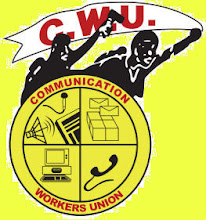On Thursday, February 22, about 80 call center workers were returning from a teambuilding exercise to Vodacom premises in Midrand. Most of them decided they did not want to wear company shirts distributed to them, and instead donned union shirts. When they arrived, the company in a blind panic ordered the doors to be locked and an army of security guards to go to the gates.
Confused and disorderly, a dozen managers who had arrived on scene finally explained to the calm workers that "they were causing an unpleasant scene and had to go." It is to be expected that the company finds the union, and its deep rooted support among the workforce, unpleasant. But to send workers home with armed guards simply for wearing a shirt that you find unpleasant may be not only an overreaction, but an illegal one. Unions are not only legal in South Africa, but in fact to hinder people from joining them is a violation of human rights as recognized by the United Nations and the Republic of South Africa.
While the company's ilegal overreaction to what workers wear might seem senseless, there is a logic to it. A strategy for maintaining exploitation and domination, as we all know too well, is attempting to control people's personal lives: Where they can live, where they can work, what organisations they can join, what they can read, and so on.
Vodacom also seeks to maintain its oppression by trying to control the personal lives of workers. Vodacom is still trying to tell workers what organizations they can join - and which ones they cannot. Apparently, they are now trying to extend their control to how workers can dress.
Vodacom should take a lesson from history. These kind of tactics never succeed, they only make us stronger.
Siyalithatha!
Subscribe to:
Post Comments (Atom)


No comments:
Post a Comment